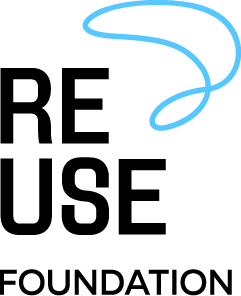Featured
INDUSTRY ATTEMPTS TO SELF-REGULATE PLASTIC USE AND MANAGE THE PLASTICS CRISES ARE FAILING |
|
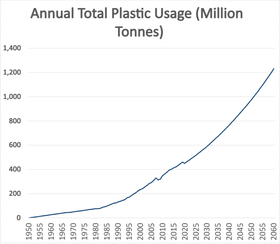
|
Concern about the environmental and health impacts of plastic continues to grow but industry efforts to self-regulate plastic usage are failing. Total plastic production and usage continues to rise and is expected to roughly triple by 2060. Just 9% of plastic is currently recycled and by 2060 OECD expects it will still be only 17%, the rest goes to landfill, gets burnt or escapes to the environment.
The main frameworks regulating plastic use are The Plastics Pact Network, convened by the Ellen MacArthur Foundation and WRAP and the Global Commitment, led by the Ellen MacArthur Foundation, in collaboration with the UN Environment Programme, that has “united more than 1,000 organisations behind a common vision of a circular economy for plastics” and boasts companies representing 20% of all plastic packaging produced globally committed to ambitious 2025 targets to help realise that common vision. Unfortunately, both frameworks are deeply flawed and neither contains a commitment to reduce or even limit plastic usage, allowing users to increase usage unabated. Since the Global Commitment framework was introduced in 2018, signatories have overall increased plastic usage by over 50 million tonnes. In place of porous and voluntary targets REUSE Foundation believes in binding regulation to manage plastic usage, along with a concerted effort to shift to reuse, which can quickly and greatly reduce plastic waste. Learn more about our work and support REUSE Foundation here.[Image Credit: © REUSE Foundation] |
Highlights
Empowering Indonesian MSMEs To Foster A Refill Lifestyle |
|
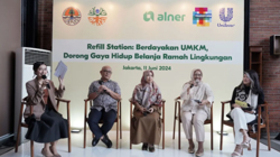
|
In celebration of World Refill Day, Alner, Unilever and EY highlighted the success of the Project TRANSFORM-Alner initiative, which has empowered 675 MSMEs to promote refill shopping, reducing 4,412 kg of plastic waste in one year. This project, supported by the UK Foreign, Commonwealth & Development Office, is pivotal in addressing Indonesia’s plastic waste issue, with the country producing 3.6 million tons of plastic waste annually. Key stakeholders discussed the refill concept as a vital solution for reducing plastic waste. Alner, a pioneer in refill packaging, uses a low-tech, cost-effective manual process to deliver refills directly to consumers, making it scalable and impactful. The project aligns with Unilever’s circular economy principles, aiming for less, better, and no plastic use. Project TRANSFORM-Alner has seen significant public interest, selling 77,624 liters of refill products and reducing single-use plastic. This success has also economically empowered MSMEs. Future goals include expanding to 1,500 points and further reducing plastic waste while continuing public education and collaboration with MSMEs.[Image Credit: © Unilever]
|
No Billion Dollar-Plus Companies Are Meeting Plastic Waste Targets |
|
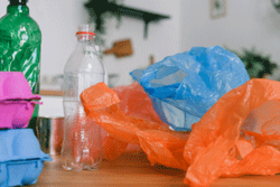
|
The 2024 Plastics Scorecard by As You Sow and Ubuntoo covers 225 companies from 15 industries. It ranks companies with revenue greater than one billion dollars on their plastic usage. 107 were awarded the lowest mark of F. Top of the list is Stella McCartney’s fashion house with a B+, but none got an A. Berkeley, California-based As You Sow urges action in six areas – recyclability, reduction, recycled content, recovery, reuse and extended producer responsibility.[Image Credit: © SHVETS production from Pexels]
|
Ho Chi Minh City Launches Campaigns Encouraging Inhabitants To Reduce Plastic Waste |
|
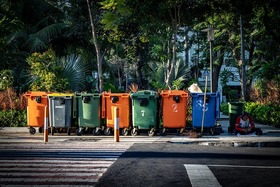
|
Ho Chi Minh City launched joint dissemination campaigns alongside businesses encouraging reduced use of single-use and non-degradable plastics, as well as plastic collection and recycling. The project promoting a circular plastic waste economy is sponsored by Coca-Cola Fund and operated by GreenHub, an NGO that successfully carried out a previous project in the Can Gio region. 27 businesses specializing in waste management will participate in the scheme, with Unilever Vietnam, Nestlé Vietnam and Coca-Cola Vietnam all announcing “ambitious” sustainable packaging goals. [Image Credit: © Niko Lienata from Pixabay]
|
Greenpeace Malaysia Promotes Reuse And Refill Policy Advancements |
|
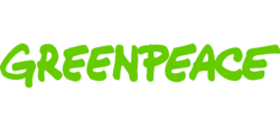
|
As well as welcoming announcements from the Malaysian government addressing plastic pollution, Greenpeace Malaysia laid out policy frameworks to reduce plastic waste based on reuse systems. More than 80 percent of respondents to a survey back promoting reuse-based solutions, with Greenpeace calling for four pillars to the National Plastic Policy: implementation and scale up of reuse and refill systems, elimination of single-use plastics, banning of toxic materials in plastics and rejection of technologies that perpetuate single-use, pollution and greenwashing.[Image Credit: © Greenpeace International]
|
Petaluma Initiative Tackles Plastic Waste With Reusable Cups |
|
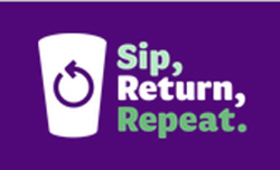
|
Starbucks, Coca-Cola, PepsiCo, Peet’s Coffee, Yum! Brands and other global and local brands have joined the Petaluma Reusable Cup Project, an initiative by the NextGen Consortium. Starting August 5, over 30 restaurants in Petaluma, CA, will replace single-use cups with reusable ones at no cost to customers, with numerous return points across the city. This project is the first of its kind in the US, aiming to make reusable to-go cups the standard across multiple restaurants, potentially reducing hundreds of thousands of single-use cups. Backed by the Center for the Circular Economy at Closed Loop Partners, the initiative focuses on creating return habits among customers, essential for the success of reuse systems and will run through November, collecting data on customer participation and environmental impact, providing a model for future reuse initiatives.[Image Credit: © Closed Loop Partners / The Center for the Circular Economy]
|
Blueland Founder Sarah Paiji Yoo Explains Her Journey To Refill Brand Blueland |
|

|
Sarah Paiji Yoo transitioned from a serial entrepreneur, specializing in marketing, to Blueland after the birth of her son and discoveries on microplastics in water. Her family went zero waste for two years before she founded BlueLand, a refillable home essentials business, the products of which are present in over a million homes. Yoo states her belief in the power of individuals, saying that the onus is on each of us to change our behavior, otherwise “the bigger levers of business or government are not going to change.”[Image Credit: © PRNewsfoto/Blueland]
|
Loop’s Deposit Return Platform To Be Tested At Monoprix In Paris |
|
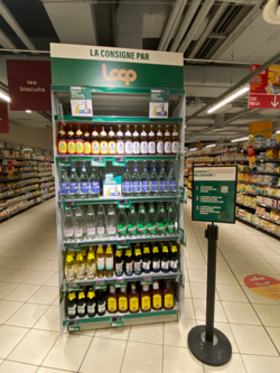
|
French convenience retailer Monoprix is testing the Loop deposit return solution in five stores in Paris as part of its efforts to reduce waste. The Loop deposit system gives consumers access to reusable, returnable packaging for everyday branded products, including Evian, Badoit, Lorina, Club Maté and William Peel, among others. Once the products have been consumed, customers can return the empty packaging to the shop to recover their deposits by dropping them off at a Loop collection point.[Image Credit: © Monoprix] |
Pernod Ricard Partners With ecoSPRITS On Circular Spirits Distribution |
|
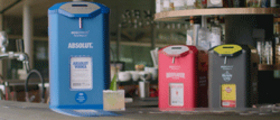
|
The spirits giants Pernod Ricard has entered a five-year global licensing agreement to use ecoSPIRITS to package and distribute its products. This is a circular packaging distribution scheme, which sees beverages transported in a closed loop packaging system in reusable 4.5 litre containers. This will hugely reduce overall carbon emissions and waste from secondary packaging materials. Beverages including Absolut vodka, Beefeater gin, and Havana Club rum are included in this distribution. [Image Credit: © Pernod Ricard]
|
The CIRCLE Alliance Supports Plastic Solutions Businesses In Developing Economies |
|
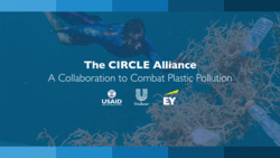
|
CIRCLE Alliance is a collaboration between Unilever, EY and USAID designed to combat plastic pollution, with a focus on businesses and women in India, Indonesia, Vietnam and the Philippines. The Alliance is the flagship public-private collaboration of USAID’s Save Our Seas Initiative and is supported by the EDGE fund and the GEEA fund, to reduce plastic waste and develop circular economies.[Image Credit: © United States Agency for International Development]
|
Henkel Ibérica Makes Sustainability Improvements |
|
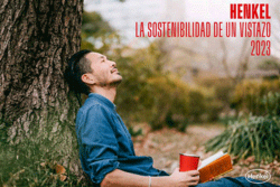
|
In Spain, the laundry company Henkel Ibérica, has reduced total CO2 consumption by 60 percent between 2010 and 2023, purchasing 89 percent renewable energy, using more than 25 percent recycled plastic, and installing 18,600 m2 of solar panels at its factory in Barcelona. 95 percent of the plant's plastic is already designed for recycling, with 89 percent of Henkel’s total plastics designed for recycling. [Image Credit: © Henkel Ibérica, S.A] |
Farms Continue To Use Plastic Sheets Despite Evidence That It Harms The Soil |
|
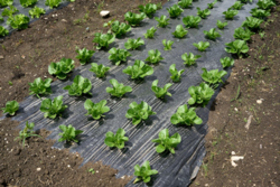
|
The use of plastic sheets to create greenhouse conditions for crops has been used in agriculture since the late 1940s, but this is far from ideal. ‘Plasticulture’ on farms is ultimately detrimental as it enters the soil as microplastics and affects soil quality, as well as being integrated into crop growth. The production of this ‘cheap and effective’ plastic to assist crop growth is also responsible for fossil fuel emissions. The author highlights the need to use plastic more sustainably and with a greater awareness of the damage it causes, as well as shifting agriculture practice away from plastic use. [Image Credit: © Steffen Lemmerzahl on Unsplash]
|
Around 70 Percent Of UK Consumers Call For A DRS |
|
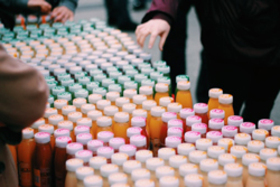
|
Environmental organizations are calling on all political parties in the UK to include a deposit return scheme for beverage bottles in their General Election manifestos. Such as scheme places a small deposit on the bottles at purchase, refunded to consumers who return the container for recycling. Existing schemes across Europe have achieved return rates ranging from 92 percent to 98 percent. A survey by Reloop identified support for the scheme among potential voters of all major UK parties: 77 percent of Conservative voters, 69 percent of Labour voters and 71 percent of Liberal Democrat voters. Although the DRS was announced by the UK Government in 2017, delays mean it will be implemented in October 2027 by the next Government. [Image Credit: © AJ Alao on Unsplash]
|
Tesco Trials Schemes To Limit Avocado Packaging |
|
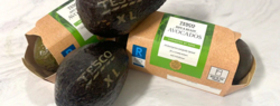
|
Tesco will trial two schemes to reduce single use plastic in avocado packaging. It is replacing plastic trays with cardboard containers and etching key information onto the avocado skin to replace barcode stickers. This is expected to avoid over 20 million pieces of plastic tray packaging and nearly a million plastic stickers annually, based on current sale statistics from Westfalia Fruit, Tesco’s main avocado supplier. Tesco sells around 70 million avocados a year, with demand up 15 percent in the last year. Trials will be conducted in 270 stores in south-east England and, if successful, will expand across all Tesco stores.[Image Credit: © Tescoplc.com]
|
New Survey Finds Gen Z Increasingly Skeptical Of Brand And Influencer Messaging |
|
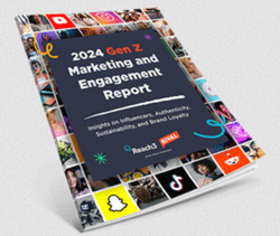
|
A survey of 18–27-year-olds in the US discovered that Gen Z is taking a more skeptical approach to online purchasing, with an decline in trust in influencers coinciding with increasing wariness over greenwashing, as well as shifting priorities towards affordability over sustainability in purchasing decisions. Also of note was the dominance of Instagram-related content influencing purchasing decisions over other social media options, as well as an increased emphasis on authenticity and trust. The survey was conducted by Rival Technologies, an AI-driven research firm and Reach3 Insights, a market-research company.[Image Credit: © Rival Technologies, Inc.]
|
Researchers Find A Fungus That Can Degrade Floating Ocean Plastic Waste |
|
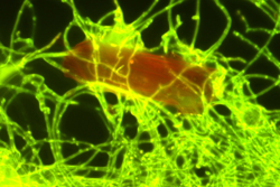
|
Researchers from the Royal Netherlands Institute for Sea Research discovered that the marine fungus Parengyodontium album can break down polyethylene plastic when exposed to UV light at a rate of 0.05% per day, converting most of it into CO2. This means the fungi can initially only degrade plastic floating in surface waters initially, limiting its contribution, given that significant amounts of different plastics accumulate in deeper. P. album is one of five marine fungi identified with the ability to degrade plastics, and scientists expect that other unknown species will also contribute, particularly in deeper parts of the ocean.[Image Credit: © NIOZ]
|
L'Occitane Partners With Others On PET Bottle From Enzymatic Recycled Plastic |
|
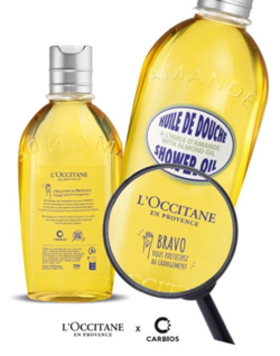
|
L’Occitane has partnered with biotech company Carbios and packaging firm Pinard Beauty Pack to create 100% PET bottles made from recycled plastics. Carbios developed an enzymatic depolymerization technique to recycle PET waste that cannot be processed with existing mechanical recycling technologies, while enabling bottle quality and transparency. This partnership will help L’Occitane achieve its goal of using post-consumer recycled PET materials for 100% of retail bottles by 2027, aligning with its aim to reduce reliance on fossil-based plastic. Carbios estimates this technique can reduce CO2 emissions by 57 percent by optimizing product circularity, reducing transport distances and integrating local collection and production systems. [Image Credit: © CARBIOS] |
Nestlé Develops Limited Edition Plant-Based Fork |
|

|
Nestlé has produced an edible fork from wheat flour and salt, as a limited-edition item for Maggi cup noodles in India, coming alongside increased paper straw usage as part of Nestlé’s commitment to reducing their plastic packaging. In China, Nestlé Nutrition is running a similar pilot for a paper scoop in adult milk powders as part of the research and development process to limit virgin plastic use.[Image Credit: © Nestle]
|
Plastic Recycling Firm Loop Industries Secures €35 Million Investment |
|
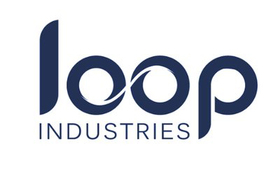
|
Loop Industries, a polyethylene terephthalate (PET) and polyester recycling company, and the European technology investment firm Reed Management, have signed an agreement for a €35 million investment from Reed to fund the Infinite Loop ™ technology with a 50/50 joint venture for European release. This is composed of a €10 million investment and a €25 million loan, which will allow the Loop technology to process low value PET and polyester waste to create a circular plastic production system.[Image Credit: © Owner Loop Industries, Inc.]
|
UK Packaging Company DS Smith Urges Tighter Plastics Regulation |
|
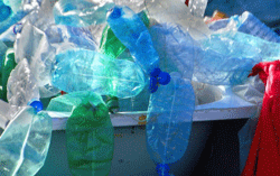
|
Packaging firm DS Smith has called on the incoming UK government to improve the regulatory framework around plastic packaging and consumption, in line with recent changes adopted by the European Union. Chief Executive Miles Roberts stated that changes in packaging, such as carboard fruit punnets, had removed 1.2 billion plastic pieces from DS Smith products, including over 270 million in the UK. This comes amid lower recycling rates in the UK and uncertainty over recycling plans under Rishi Sunak’s government.[Image Credit: © VIVIANE M. from Pixabay]
|
Google Accelerates Plastic Pledge And Provides Blueprint To Others |
|

|
Google will beat its initial commitment to remove plastic packaging from its consumer electronics packaging by 2025 by 6 months and will release a 60-page document to help competitor companies achieve similar goals. Whilst their novel paper & fiber-based packaging is more expensive and required internal development to accommodate lifespan, drop dynamics and water resistance, Google believe that increasing scalability will mitigate that cost.[Image Credit: © Google LLC]
|
GoUnpackaged Aims To Standardize Refills Across The Supply Chain |
|

|
GoUnpackaged is working with Aldi and Ocado to standardize refills and remove single-use plastics from the supply chain. It aims to remove the need for supermarkets to perform novel tasks, such as cleaning refillable containers, and perform that themselves. It’s begun early trials. Using an open-source business model, it also aims to facilitate company-specific refill capacities, as well as reduce costs overall. GoUnpackaged also provides consultancy and policy advice and believes that job creation in novel refill processing is central to its potential for success, along with advocating for changes in the regulatory framework such as the PPWR (Plastic and Packaging Waste Directive) in Europe.[Image Credit: © GoUnpackaged]
|
Unilever’s CEO Urges Governments To Do More To Secure Global Plastics Treaty |
|
.png?width=280)
|
Unilever’s CEO, Hein Schumacher, said there’s no time to waste in agreeing a Global Plastics Treaty. He talked during a plenary session at the latest round of negotiations, in Ottawa, on behalf of Unilever as a member of the Business Coalition for a Global Plastics Treaty. He later wrote that a treaty is “exactly what business needs”. He is calling on governments to level the playing field, saying that “business responds to regulatory certainty, but the reality is we are facing a hugely fragmented policy environment for packaging from country to country”. Hein says plastics reduction is the fastest way to cut plastic pollution, but “how the treaty will seek to reduce virgin plastic production remains unclear” and the same can be said for “how it will help scale reuse and refill models.” He was encouraged by progress in some areas but said “governments should prioritise discussions on upstream measures such as phasing out problematic and avoidable plastic products in a globally coordinated way, and harmonising design criteria for plastic packaging.” [Image Credit: © Unilever]
|
Reversing The Growth Of Ocean Microplastic Will Need Drastic Actions |
|
.jpg?width=280)
|
Researchers at Imperial College London and GNS Science found that reducing plastic pollution by 5 percent annually would stabilize levels of microplastics in oceans, but even a 20 percent reduction annually would not lower existing levels significantly. One of the authors. Zhenna Azimrayat Andrews, said: “there can never be a completely successful removal of microplastics from all depths of the ocean, we kind of just need to live with it now. But the current global output of plastic pollution is so great, that even a 1% annual reduction in pollution would make a big difference overall.” [Image Credit: © Lucien Wanda from Pexels]
|
Sachets Are Major Environmental Problem, But Little Is Being Done About Them |
|
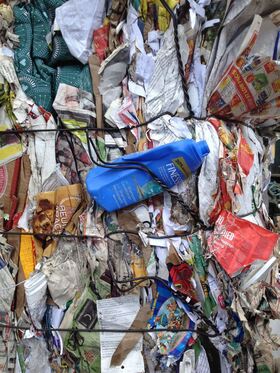
|
Research suggests that over 850 billion small plastic sachets containing small amounts of products from personal care goods to condiments are sold each year. They are largely targeted at low-income markets, with Southeast Asia contributing around half. The number could reach some 1.3 trillion within four years. Sold on their affordability and convenience benefits, they are however a major environmental issue: they are made from a lamination of different materials, making them close to impossible to recycle economically at scale. Instead, they are often discarded, ending up in landfill or clogging waterways.
An audit by BreakFreeFromPlastic, covering 50 locations in India, Indonesia, the Philippines and Vietnam between October 2023 and February 2024, collected over 33,000 sachets, attributed to 2,678 brands. 86 percent were food items. Major producers include multinationals like Unilever, Procter & Gamble and Nestlé, as well large regional brands. One waste picker in India says sachets are practically impossible to collect because they are so small, and they are worth little even if collected. In The Philippines, the culture of refill, called “tingi” in the country, is re-emerging. Aloja Santos, founding president of the Philippine National Waste Workers' Alliance, says refill should be encouraged by banning sachets and incentivizing reuse and refill.[Image Credit: © Vivianne Lemay on Unsplash] |
WWF Publishes A Blueprint For Companies To Act Credibly On Plastic Pollution |
|
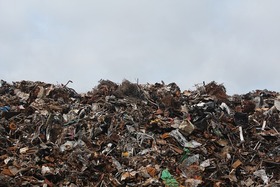
|
The World Wildlife Fund’s Blueprint for Credible Action on Plastic Pollution aims to guide companies in moving from awareness efforts and commitments to measurable progress. It outlines four steps: understand the crisis and set ambitious goals; transform the company’s plastic footprint; advocate with others for system change; and invest in circularity beyond the company’s direct operations. WWF says the outcomes would include: better data and data harmonization, making collaboration with regulators and investors easier; targeted plastic pollution actions within the company’s direct control; readiness to advocate with other companies, stakeholders and policymakers; and product portfolios that are envisioned and designed for a just and equitable future. [Image Credit: © Pexels from Pixabay]
|
